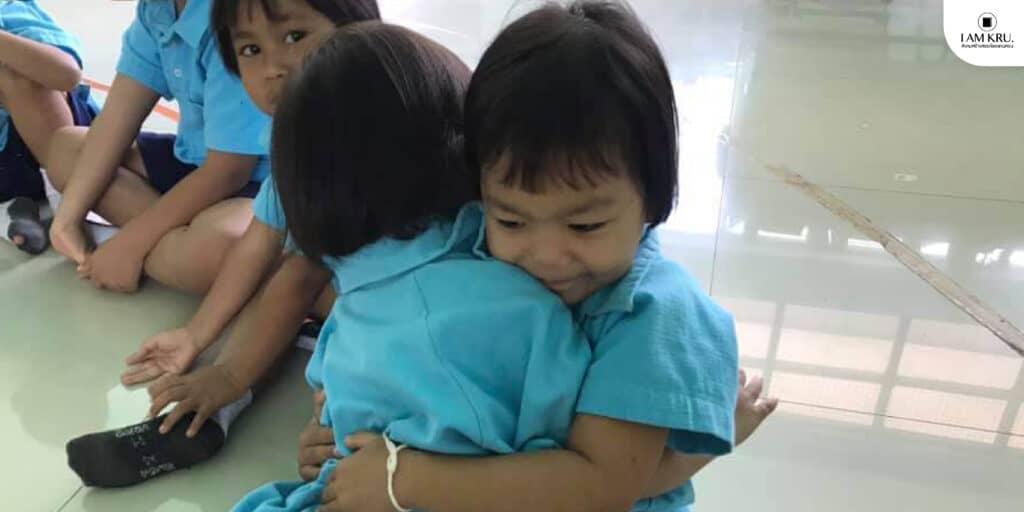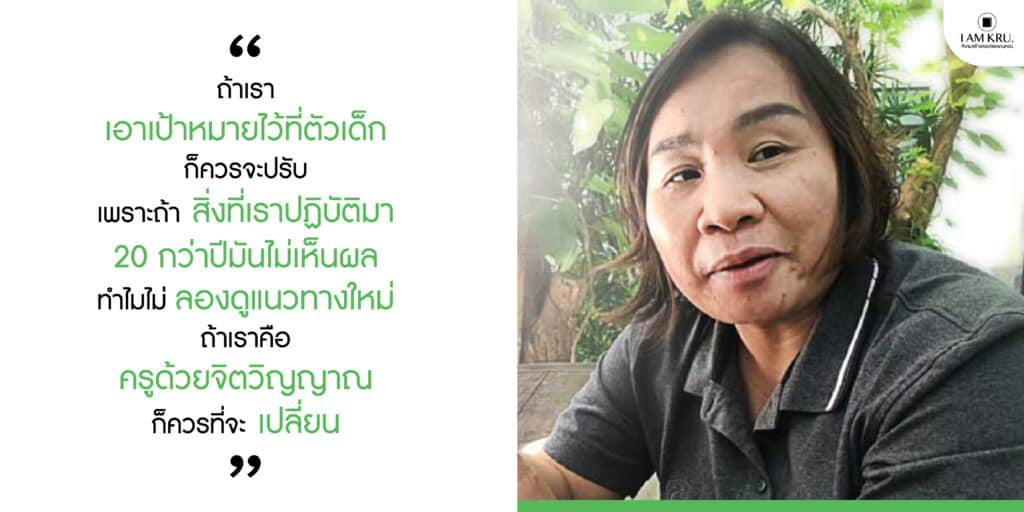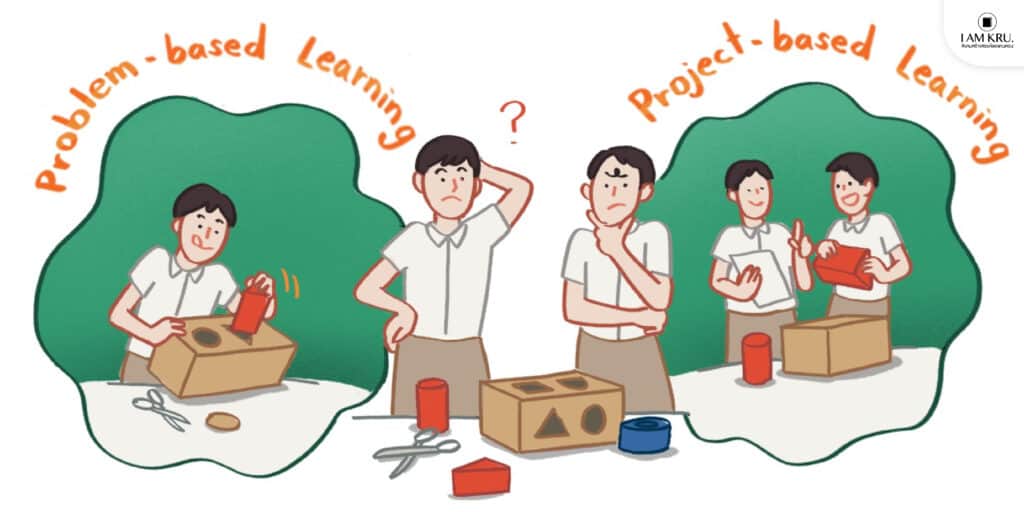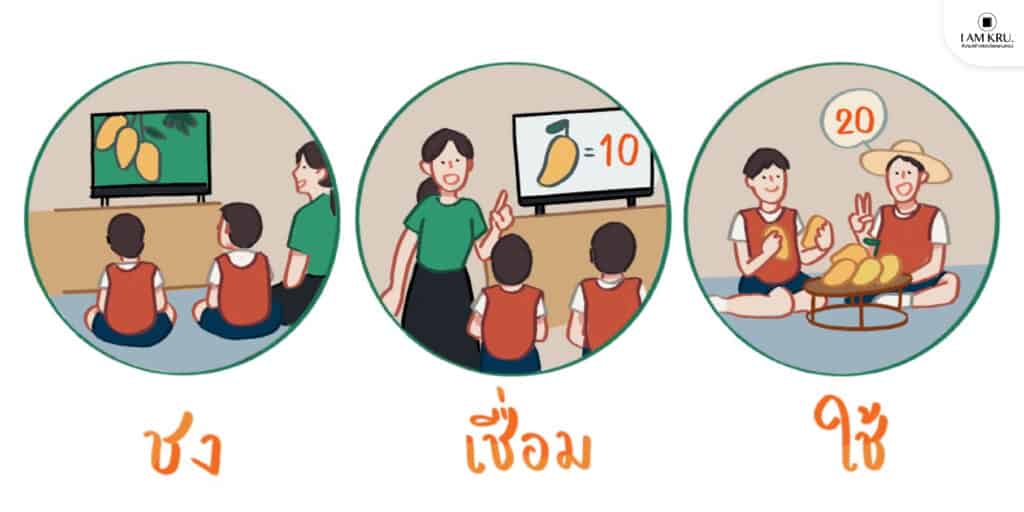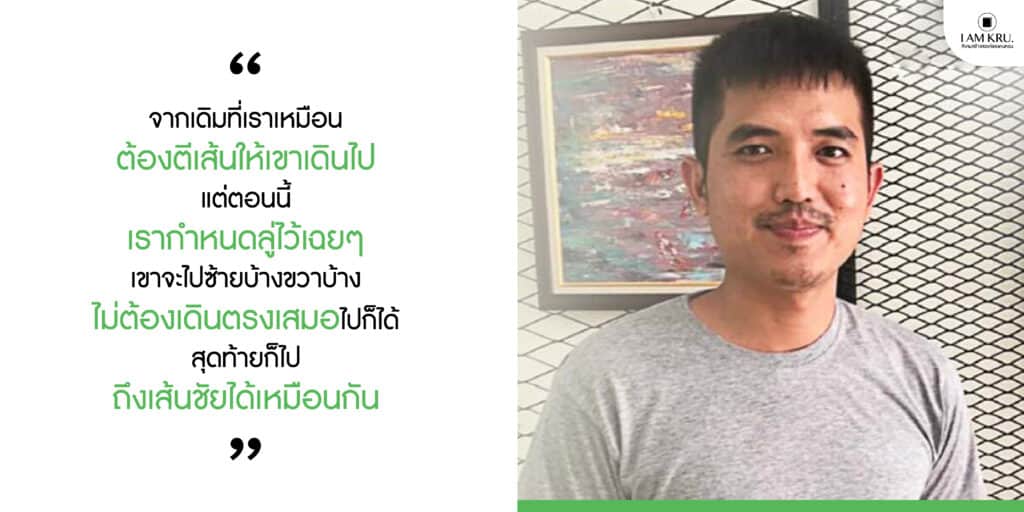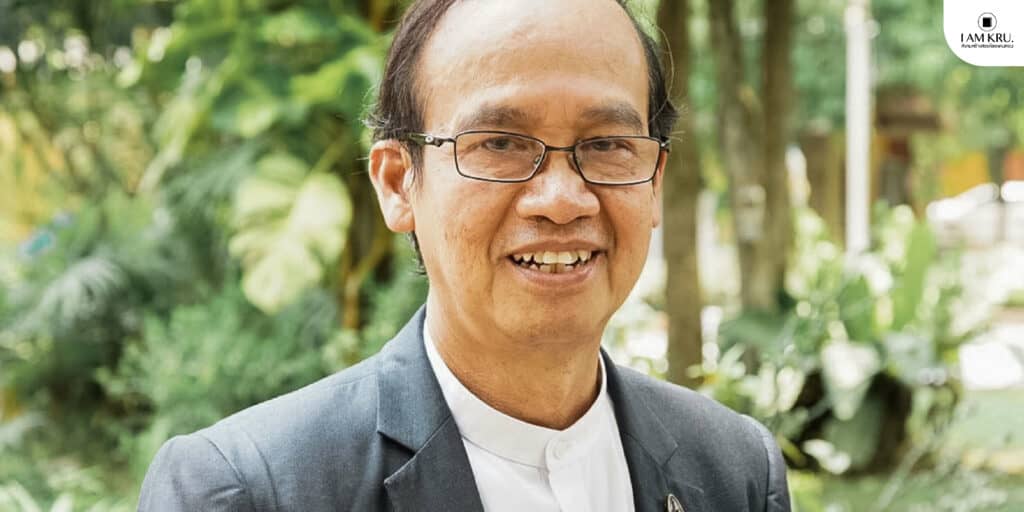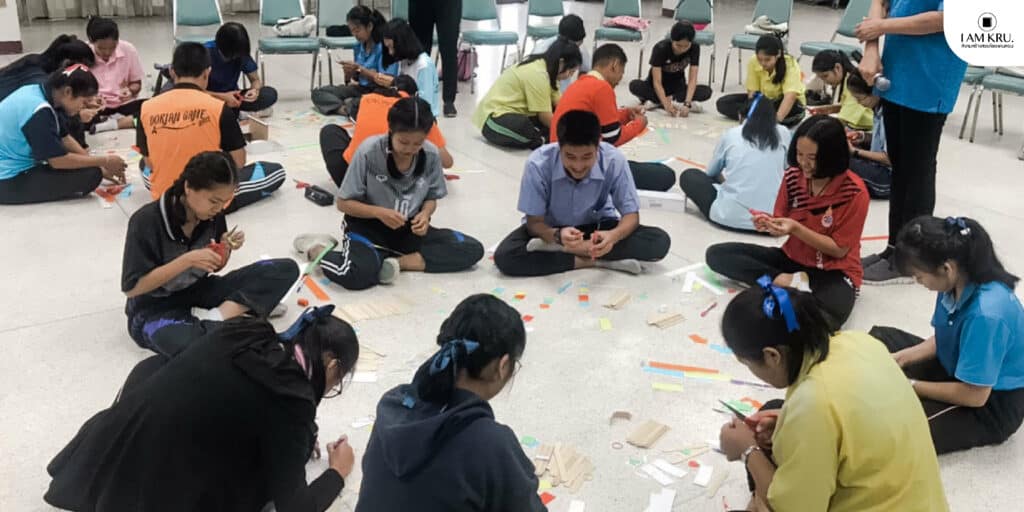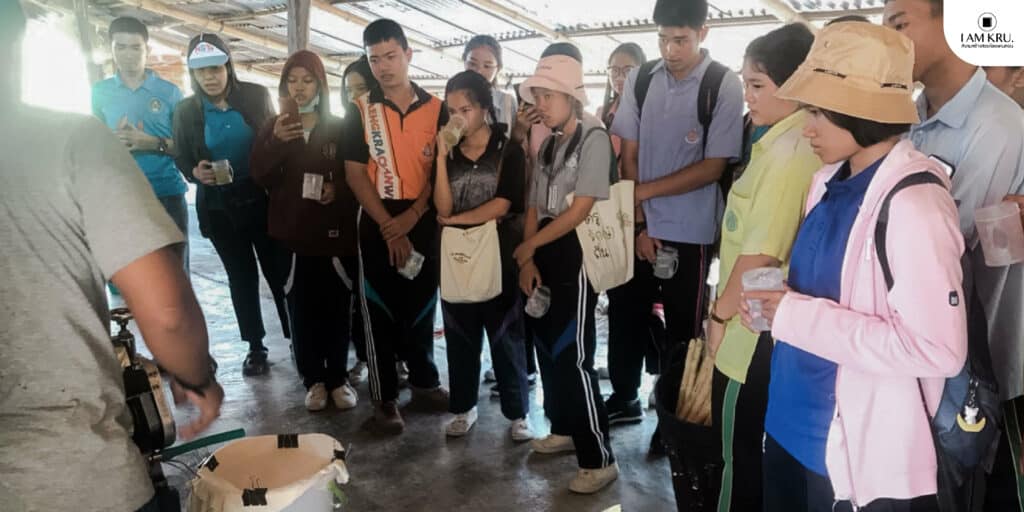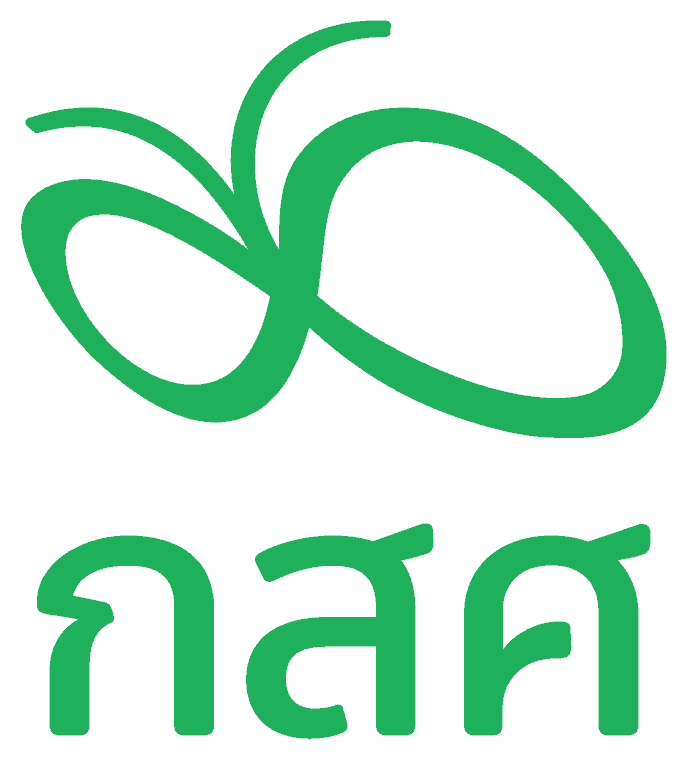Many children are falling out of the education system. Even though the law can help, who is ready to step in to solve this problem? As career guidance teachers, we see overlapping issues. The same problems we encountered before are still faced by students. We try to solve them, give advice, and help the children grow. However, in the end, society continues to pass on the same old culture, thoughts, and beliefs. So, we still can’t solve the problem on a larger scale.
– Teacher Siriporn Tumsingh –
On the occasion of the I AM KRU website and page reaching its one-year anniversary last November, I AM KRU would like to invite a discussion on the topic of “Voices from Teachers” to the “Thai Education System” to exchange knowledge with teachers and educators. This discussion will feature four educators: Teacher Sanya Makrin (Teacher Sor Yor)(one of the founders of Thai Home University in Si Chomphu district, Khon Kaen, a former civil servant teacher), Dr. Voravoot Subhap (Teacher Pu)(a lecturer at the Faculty of Education at Srinakharinwirot University), Dr. Attachon Sajjaphatanakul (Teacher Ka Na) (Chair of the Social Studies Department at the Faculty of Education at Pibulsongkram Rajabhat University), and the moderator, Teacher Siriporn Tumsingh (Teacher Jeang)(founder of the “Child Rights Campaign” page, a former civil servant teacher).
The main topic of discussion is “The Overwhelming Responsibilities of Teachers”. Today, Thai teachers are not only tasked with teaching and developing the potential of students but also have to bear the burden of many other duties such as logistics, accounting, organizing various projects as mandated by the central authority, and preparing for teacher quality assessments that do not take classroom quality into account. We invite everyone to find answers to why teachers have to take on these roles and why the problems with education have not yet been resolved, with the hope that these voices will reach various agencies that can determine the direction of education and that everyone in society will join together to be a voice for better education in Thailand.
“The Bottleneck System” from the Central Administration
Limits the Capabilities of Both Teachers and Students
The first issue that educators unanimously agree upon as a deeply rooted problem is the policy from the central administration and the culture passed down from generation to generation. Historically, the state has used schools as tools to create ideal citizens through mechanisms designed by the state, where teachers in schools are unable to question the ready-made processes or do anything outside the central framework. Therefore, teachers cannot fully create their own classrooms. One piece of evidence showing the central administration’s lack of trust in teachers is the policy of professional status assessment, which forces teachers to complete a large amount of paperwork and take additional courses as specified to collect certificates as evidence of self-development in the way the state wants.
“This process stems from the state’s lack of trust in schools and the teaching designs of teachers, hence the need for various indicators and inspections. If the ministry trusted [the schools], it would let teachers stay with their classrooms and just teach. The duty of teachers is only to pass on the state’s ideals using assessment models, fixed indicators, rigidly set curricula, and budget frameworks from the state,” Dr. Voravoot stated.
The culture passed down within the education system, when viewed on a larger scale, reveals centralized power in political management. It is evident that operations must pass through decisions from the central administration. The involvement of parents and others is just a “ceremonial process,” with occasional meetings only and no chance to co-create children’s learning from the start. Additionally, only parents who can afford to take time off to participate with the school are involved, while less fortunate parents cannot participate due to life quality constraints that prevent them from taking time off work for school, highlighting a disparity that has a political dimension. Education thus reflects the use of political and administrative power.
“Education is not merely a tool for creating a workforce for large corporations or capitalists, as suggested by simple societal questions like ‘What do you do after graduation? What do you study next?’ No one asks if graduates have fulfilled their own dreams or if education has enabled them to become fully potent humans because these questions are within a liberal regime. Educators, therefore, need a dynamism of thought that recognizes political issues in education as well,
At the same time, we cannot avoid the reality that education is a matter of politics. It’s impossible to say there’s no politics involved. Education ministers come from political parties, and everyone has a political way of thinking. Every policy implemented is based on considerations of what the end result will be. Why must Thai teachers have their teaching time reduced and instead spend time on ceremonial processes more than on academic matters? It’s all a matter of policy,” Dr. Attachon commented.
One subject that clearly reflects politics is “Career Guidance,” as it allows students to question themselves, discuss their identities, and enhance their potential. However, Teacher Siriporn, as a former career guidance teacher, reveals that current education cannot reflect democracy.
“Teachers want to foster growth in students, but teachers themselves have not grown enough to know how to break these limitations. Many children drop out of the education system. Although the law can help, who is ready to solve this problem? When we become career guidance teachers, we see overlapping issues. The old problems we faced are still encountered by students. We try to fix them, provide advice, and help students grow, but in the end, society still passes on the same old culture and beliefs. So we still can’t solve the problem on a larger scale,” Teacher Siriporn said.
Together Creating a Network of Change
Considering the root causes of educational problems, we invite a discussion on how to solve them. It can be concluded from all educators that there is no quick fix, but it must be done in steps, where everyone knows their role in supporting education.
Educators invite change by “changing teachers” to understand their own perspectives,to rise up to question, and to express their own thoughts and beliefs. Because a teacher’s viewpoint is the heart of changing the classroom into an egalitarian learning environment, where students see the value of learning exchange when they have teachers as role models.
Teacher Sanya said, “Teachers need to know what values and beliefs they hold. What is our philosophy of education? Once we know, we will see our direction more clearly. We will not compromise when we have beliefs. Another point is that we must take real action. When we do, we benefit from it, knowing what works and what doesn’t. Wisdom comes from practice, then share what works to inspire others.”
Another important point proposed by Teacher Sanya is that teachers must always learn anew because yesterday’s success may not apply today. They must know how to learn, relearn things from a new perspective, and unlearn to avoid clinging to old knowledge, to develop themselves.
Once we know and understand ourselves, then we begin the steps to create change. Educators believe that acting alone cannot be sustained in the long run and may cause teachers to lose heart and the positive drive needed to continue. Therefore, cooperation is needed from both teachers and others in society. Every school should have such teachers to stimulate students to think this way and to find a group of like-minded individuals to join in creating a network of change, pooling ideas on how to design classrooms, establish learning systems, and transfer attitudes to elevate education to a place truly for teachers and students.
“Why can we still be in this system? Because the system still needs people like this. If we all feel that this system is not good and run away to find like-minded parties, then there will be no one to encourage children to think. Positive change does not happen to us alone but must be created with the thinking of other children as well.
We must be inspired, constantly asking ourselves what we are doing and what our goals are. If our goals are grand, we are willing to endure a little pain to keep them in sight. Others will see our persistence as an example and will follow suit. The second thing is that this group of people must come together, share things with one another, heal each other when hurt, build morale, and then return to their communities,” Dr. Voravoot stated.
Changing from Old to New Culture
If we want to improve Thai education, educators believe we must change from the root, from old culture to new ideas. They encourage a policy change to make schools a safe space, free from old problems and redundant lessons of the past.
Dr. Attachon suggests that the Thai state should move away from positivist thinking, which has always demanded empirical evidence. Looking back at the issue of accumulating certificates, when educational personnel receive the idea that certificates are a tool to demonstrate capability, they use the same method to evaluate students for university admission, by having students submit portfolios of certificates, which do not truly measure the results of learning and teaching. Classroom processes are neglected, focusing instead on other things.
“Ultimately, we must change the culture to a new one, change to a new way of learning that aligns with the changing world, because education is about the future. No one conducts education in retrospect. Every country, every society looks to the future. If we still apply old culture to education, we won’t get anywhere. Good teachers become demotivated and leave, and the learning community of teachers collapses because of the old culture.”
The call for a change in the cultural roots of education must be as powerful as possible. Certainly, no one knows the problems of teachers better than the teachers themselves who have always been oppressed. Therefore, educators invite teachers to voice their concerns to the central administration about which policies should be abolished to relieve teachers’ discomfort, to help scrutinize the work of the central administration, to think critically, not to tolerate the old culture, instead of letting outsiders, who are not the actual victims, speak on their behalf as before.
Dr. Voravoot sends encouragement to the new generation of teachers, “We see a lot of change being made by new teachers in the past 4-5 years. New teachers are creating memorable and impactful experiences for students, leading to thinking, questioning, and self-change. These new teachers are our hope. Seniors need to take care of juniors to help them grow and be companions in changing education. From a small group, it expands continuously. Don’t lose heart too soon. Just as a banana plant flowers slowly, the change in Thai education must continue to be hoped for in the future, to occur in the hands of new teachers.”
And to conclude with advice from Dr. Attachon
“Education is not only a matter of experts but concerns everyone. Even if we are not ready, we must help to raise our voices. If parents want better education, they must speak up as well. We must collectively push certain issues. Public issues cannot be left to one person. Education needs a large platform for teachers, as practitioners, parents, and everyone to come together and speak up because education concerns everyone.”
I AM KRU. hopes that the topics discussed here can spark change within teachers and lead to the spread of new perspectives widely, to create a “Network of Change” as intended by I AM KRU throughout the past year.
Teachers, educators, and all interested parties can follow other interesting educational topics such as classroom activities, teaching models, and stories of teacher.
94
Writer

- Admin I AM KRU.
